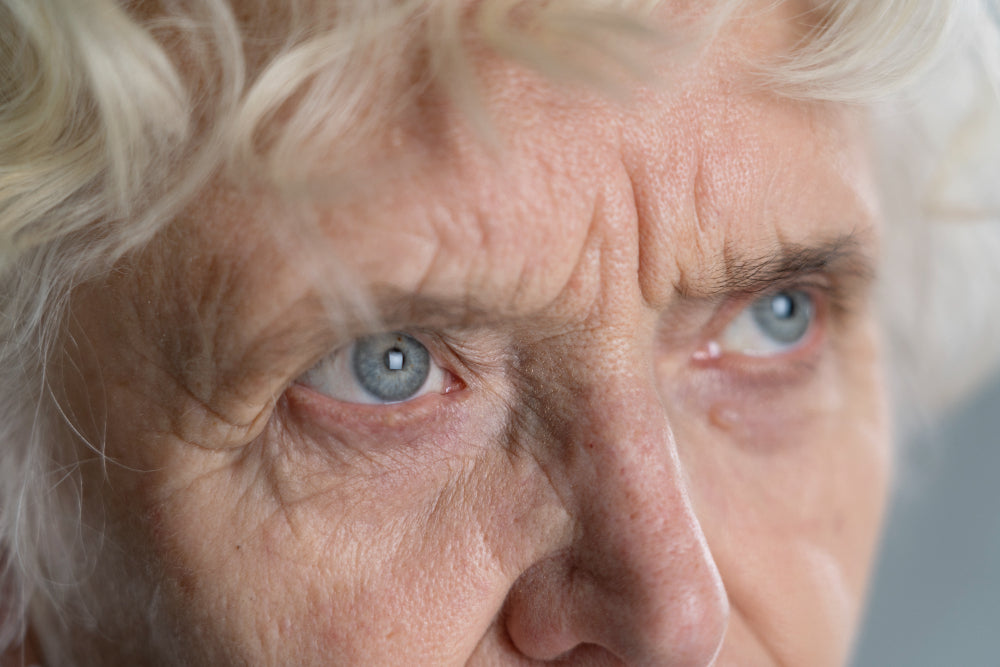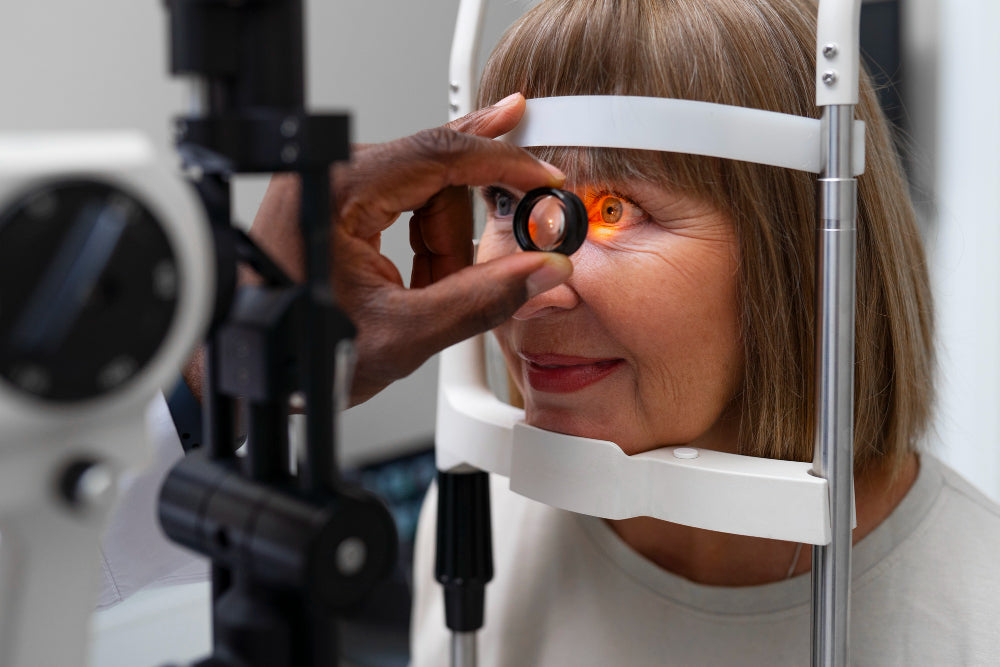Macular degeneration is a primary cause of vision loss and can be a gradual or swift journey, depending on its progression and type. For those diagnosed, the pressing question often is, "How long does it take to lose vision with macular degeneration?"
The answer varies: in early stages, vision may decline slowly over years, while advanced stages, particularly wet AMD, can cause rapid vision loss within months. Understanding this timeline is important—not only for planning treatments but also for adapting to lifestyle changes that can help preserve remaining vision.
Let's explore what factors influence the vision loss rate and how each macular degeneration stage impacts the journey ahead.
Understanding Macular Degeneration
Macular degeneration is a progressive eye condition primarily affecting the macula, the central part of your retina responsible for clear and detailed vision. There are two main types of age-related macular degeneration:
- Dry AMD: This is the most common form and progresses gradually over several years. It involves the thinning of the macula and can lead to blind spots in central vision.
- Wet AMD: This type is less common but can lead to rapid vision loss due to abnormal blood vessel growth under the retina. Symptoms can manifest quickly, sometimes within days.
Phases of AMD Progression

Macular degeneration, specifically age-related macular degeneration (AMD), progresses through several stages. Here's an overview:
1. Early AMD
In the early phase, AMD may not present noticeable symptoms. Vision remains clear, and individuals might not realize they have the condition. However, an eye exam can reveal yellow deposits called drusen beneath the retina. Small to medium-sized drusen are typically indicators of early AMD.
Symptoms: There is no vision loss or symptoms at this stage, although the presence of drusen can be seen during a comprehensive eye exam.
2. Intermediate AMD
The drusen becomes larger during intermediate AMD, and pigment changes may occur in the retina. Some people experience mild vision changes, like slight blurriness or difficulty seeing in low light, although others may still not notice any symptoms.
Symptoms: Minor vision problems may occur, such as slight blurriness and difficulty seeing clearly in low-light conditions.
3. Advanced (Late) AMD
At this stage, AMD has developed into one of two advanced forms: dry AMD (atrophic) or wet AMD (neovascular). Each of these can cause more severe vision loss.
Dry (Atrophic) AMD: This is the most common advanced stage and occurs when the macula's light-sensitive cells begin to deteriorate. Central vision loss becomes more noticeable, especially for tasks like reading or recognizing faces.
Symptoms: Significant blurriness in the central vision, reduced ability to see fine details, and increased difficulty in low light.
Wet (Neovascular) AMD: This less common but more severe form occurs when abnormal blood vessels grow beneath the retina. Bleeding and fluid leakage lead to rapid vision loss, and immediate treatment is crucial to slow down vision loss.
Symptoms: Sudden, significant central vision loss, straight lines appearing wavy or distorted (known as metamorphopsia), and central blind spots.
4. End-Stage AMD
In end-stage AMD, substantial central vision is lost, and individuals may only retain peripheral vision. While complete blindness is rare, central vision loss significantly impacts daily life, including reading, recognizing faces, and performing detailed tasks.
Symptoms: Severe central vision loss, leaving only peripheral vision, making it challenging to see details, read, and recognize faces.
How Long Does It Take to Lose Vision with Macular Degeneration?
The rate of vision loss from macular degeneration varies widely. For most individuals with dry macular degeneration, vision loss can take years. This gradual decline may allow time for adaptation and lifestyle adjustments, but it's important to note that the rate and severity of vision loss differ from person to person.
Changes in vision can occur more quickly with wet macular degeneration. Without timely treatment, wet macular degeneration can cause significant vision loss within months. However, prompt intervention can often slow or stabilize this progression, preserving functional vision.
Do You Always Lose Vision with Macular Degeneration?

Not everyone with macular degeneration will experience severe vision loss. Many factors, like genetics, lifestyle choices, and early intervention, play a role in determining the outcome. In some cases, with the right care and lifestyle adjustments, you may be able to slow the disease's progression and protect your vision.
How Vision Source Rio Can Help
At Vision Source Rio, our focus is not just on providing eye exams but on helping you manage your eye health proactively, especially if you're dealing with a condition as complex as macular degeneration.
Our Comprehensive Eye Exams allow us to detect early signs of macular degeneration, which can be crucial for effective management. By closely monitoring your retina and macula's health, we can recommend treatments and lifestyle changes that may help slow the disease's progression.
For those already diagnosed with macular degeneration, we offer Retinal Imaging and OCT (Optical Coherence Tomography), advanced technologies to help us get a detailed retina view. With OCT, we can identify even the smallest changes in your retina, helping us catch any disease progression early.
This information can be invaluable for creating a personalized treatment plan to protect your vision. We also offer Adapt Dx testing, which can detect the earliest signs of macular degeneration by testing a patient’s dark adaptation.
With this type of testing, macular degeneration can be detected 2 to 3 years prior to any clinical signs or symptoms arising. In addition, we utilize Macula-Risk NXG testing to determine a patient’s ultimate risk and timeline for preventative testing to help prevent vision loss with macular degeneration.
During this test, a cheek swab is performed and sent off to the lab where genetic factors are analyzed. Genetic markers coupled with lifestyle choices ultimately determine the progression of macular degeneration. Macula-Risk testing allows us to customize both your diagnostic testing schedule and your supplement regimen.
When it comes to supplementation, one size does not fit all. Macula-Risk provides us with information specific to you that allows us to tailor your supplementation profile directly to the way your genotype responds to therapy.
Managing Macular Degeneration: Treatment and Lifestyle Choices

Although macular degeneration has no cure, various treatments and lifestyle adjustments can help slow its progression. Here are some strategies that can help protect your sight:
1. Antioxidant-Rich Supplements and Foods
Studies have shown that certain nutrients, including lutein and zeaxanthin, are beneficial for eye health. The yolk of an egg and animal liver are two of nature’s most potent antioxidant-rich foods. We also prescribe MacuHealth, MacuHealth Plus, and MacuHealth DM as an important part of the supplement regimen.
In addition, it is highly recommended to avoid seed oils, trans fats and processed foods. These cause inflammation throughout the body and in so doing can accelerate the progression of macular degeneration.
2. Quit Smoking
Smoking notably increases the risk of developing macular degeneration and can accelerate its progression. One of the most effective ways to protect your vision is to quit smoking.
3. Regular Eye Exams
Routine eye exams are essential for tracking changes in your vision. Vision Source Rio recommends a minimum cadence of annual exams to detect any early signs or progression of macular degeneration and will adjust your treatment plan as dictated by the additional testing described above.
4. Treatment Options for Wet Macular Degeneration
Anti-VEGF injections are the most common treatment for those with wet macular degeneration. These injections help slow the growth of abnormal blood vessels in the retina, lowering the risk of significant vision loss. At Vision Source Rio, we can coordinate with specialists to ensure you receive the right treatment for your condition promptly.
Take Charge of Your Vision Health Today
Macular degeneration can be daunting, but with the right support and proactive care, you help protect your vision and maintain your quality of life. At Vision Source Rio, we're dedicated to helping you navigate every step of your eye health journey. We offer specialized services such as Comprehensive Eye Exams and Retinal Imaging to give you the best chance of preserving your sight.

If you're concerned about macular degeneration or have noticed changes in your vision, don't wait. Contact us at Vision Source Rio to schedule an appointment today. Our team is here to help you take charge of your eye health with compassionate, personalized care. Protect your vision today and for years to come!





